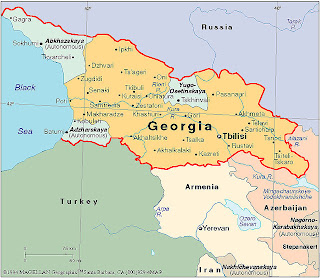
I’ve spent the last few days recoiling at the excesses of the Russian propaganda machine. I still believe that the constant refrains of “genocide” and “ethnic cleansing” are absurd, and I’m frustrated by out-and-out falsehoods such as the claim that the western media didn’t cover the developing crisis prior to the Russian intervention a few days ago.
But I think that this annoyance, in conjunction with my fundamental sympathy for the Georgian project, has clouded my judgment. The fact is that it is extremely difficult to know what is going on in the conflict. The Georgians have made a number of claims that have turned out not to be true, most recently that the Russians had taken Gori.
It is quite true that the Russians were bombing Gori, and that the Georgians suddenly fled the city, but it was also a staging ground for the Georgian offensive that started the conflict. As someone emailed me earlier today:
Strange things are afoot. Georgia is now claiming that Russia is preparing to assault Tblisi, and that Russia has taken Gori. But Russia is denying this; Reuters is reporting no signs of Russian troops in Gori. Russia is also claiming to have pulled back from one of the towns [Senaki] they seized earlier near Abkhazia. Are the Georgians trying for a western sympathy play? At this point you’d think that the ground attack on Tblisi would be well underway, but it’s not (just aerial bombardment).
Reading the op-eds is super annoying. Notice how Anne Applebaum, Richard Holbrook, etc., claim that “who started it” is unclear. All clear-eyed commentators, even those critical of Russia, at least admit that Georgia (foolishly) started this one. Why do they feel like they need to make factually ridiculous statements in order to criticize Russia? All it does it cement the perception that the West is unabashedly anti-Russian. Stupid.
Right. Let’s keep something clear. While we don’t know who started the low-level shooting between South Ossetia and Georgia, we do know that the Georgians launched a massive attack against South Ossetia. We also know that they did this not long after calling for a cease-fire, and signaling that they were going to work with the Russians to de-escalate the situation.
So although I wouldn’t characterize myself as pro-anyone in this conflict, I think that, given the wave of western pundits comparing the Russians to the Nazis, it might be useful to consider things from the the Russian perspective.
• The Russians think of themselves as intervening to protect the South Ossetians against a hot-headed leader who has repeatedly talked of taking the territory back by any means possible, including force.
• Saakashvili launched an offensive after claiming to want negotiations to stop the escalating crisis. He did so less than twenty-four hours after calling for cease-fire negotiations, in an operation that looks like it wasn’t dreamed up overnight (but, given some of its tactical mistakes, it might as well have been).
• The Russians respond with overwhelming force but limit their ground operations (so far) to the break away republics and adjacent staging grounds for Georgian actual or potential military operations. They initiate a naval blockade and commence bombing runs inside of Georgia. The west accused them of “dangerous escalation.”
• But if this were a United States operation you can bet that the US navy would be blockading the country and the USAF would be taking out every piece of military hardware or key transportation hub they could find. Indeed, the US would be actively aiming at regime change. The United States did all of these things in the Kosovo campaign.
• And the US might also be disinclined to trust subsequent cease-fire requests.
Now, I’m not saying that Russian intentions are benign, or that they didn’t escalate the conflict into clearly unprovoked “territory,” or that the deaths of anyone in this conflict are “justified.” I also can’t blame the Georgians for continuing attacks given Russian encroachment on their (unambiguous) territory–encroachment linked to Russian support for an enclave under their de jure sovereignty.
I am saying that a number of western politicians, and their pundit enablers, should take a long hard look in the mirror; they also need to consider that a lot of the information coming from Tblisi has an agenda behind it, and not all of it is true.
UPDATE: via Rob Farley, a Mikhail Gorbachev OP-ED expressing some of these points.
ANOTHER UPDATE: Smaug does an excellent job of laying out the reasons why one might take a more charitable line toward Tblisi and one less so toward Mosvow.
Daniel H. Nexon is a Professor at Georgetown University, with a joint appointment in the Department of Government and the School of Foreign Service. His academic work focuses on international-relations theory, power politics, empires and hegemony, and international order. He has also written on the relationship between popular culture and world politics.
He has held fellowships at Stanford University's Center for International Security and Cooperation and at the Ohio State University's Mershon Center for International Studies. During 2009-2010 he worked in the U.S. Department of Defense as a Council on Foreign Relations International Affairs Fellow. He was the lead editor of International Studies Quarterly from 2014-2018.
He is the author of The Struggle for Power in Early Modern Europe: Religious Conflict, Dynastic Empires, and International Change (Princeton University Press, 2009), which won the International Security Studies Section (ISSS) Best Book Award for 2010, and co-author of Exit from Hegemony: The Unraveling of the American Global Order (Oxford University Press, 2020). His articles have appeared in a lot of places. He is the founder of the The Duck of Minerva, and also blogs at Lawyers, Guns and Money.


0 Comments